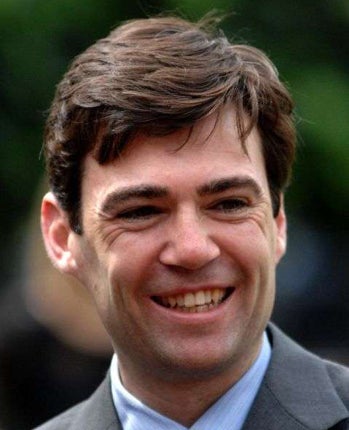Creative Britain must be kept in good health
The departing Culture Secretary Andy Burnham says we cannot afford to waste the creative talent of a new generation

Your support helps us to tell the story
From reproductive rights to climate change to Big Tech, The Independent is on the ground when the story is developing. Whether it's investigating the financials of Elon Musk's pro-Trump PAC or producing our latest documentary, 'The A Word', which shines a light on the American women fighting for reproductive rights, we know how important it is to parse out the facts from the messaging.
At such a critical moment in US history, we need reporters on the ground. Your donation allows us to keep sending journalists to speak to both sides of the story.
The Independent is trusted by Americans across the entire political spectrum. And unlike many other quality news outlets, we choose not to lock Americans out of our reporting and analysis with paywalls. We believe quality journalism should be available to everyone, paid for by those who can afford it.
Your support makes all the difference.This is a great moment for Britain's creative businesses. While globally, traditional industries are struggling to adapt, Britain's new generation of talent is seeing – and seizing – opportunity in this fast-changing world. If you needed a reminder of the breadth of our worldwide influence in the creative industries, then the annual Hospital Club 100 should leave you in no doubt that our reputation as innovators is as strong as ever.
Last year, when I set out my blueprint to shift the creative industries from the margins to the mainstream of economic and political thinking, the global economy was in very different shape. "Creative Britain" celebrated our international success in businesses like film, video games, advertising and fashion, and mapped out a vision where all our major cities would be driven by creativity, with job opportunities on offer in every region.
Of course, a lot has changed since then, and the steep downturn, coupled with the threat of international competition as more countries wake up to the economic potential of creative industries increases, makes achieving that ambition a greater challenge. To emerge from our present economic problems in good shape, we need to work now. We need young people to feel confident that these industries offer realistic opportunities. If not, their creative potential could well be lost. It's not so long ago that support for these sectors, just like culture and sport, was the first in the queue for cuts when the economy was dipping.
These are not luxuries for the good times, to be ditched in times of trouble. We are investing in skills and jobs, building clear routes from schools and colleges into creative careers, making sure that young people have a choice to use their talents in a creative capacity. Ideas are the raw material of the creative industries. We need to capture our children's imagination and inventive enthusiasm early, which is why we created the Find Your Talent scheme, to give school pupils access to high quality culture – not just as passive consumers, but as practitioners too. Once that talent is unlocked, there must be opportunities to develop the skills to build a successful career.
In Knotty Ash, Liverpool, last month, Feargal Sharkey, pictured right, and I had the pleasure of opening the first of ten Government-funded, professionally equipped music rehearsal spaces. Young musicians in deprived areas will have free access to top quality facilities, to give them a chance to join the long list of British talent that has deservedly dominated the music world for generations. Others will learn new skills like sound engineering and event promotion to set them up for a career in the music business. I was struck by something Feargal said to me that day: when he was first starting out in The Undertones, he was the only one of his original group of friends from school who had found a job.
New creative apprenticeship schemes are being developed around the country; Creative and Cultural Skills, the body responsible, has signed up over 160 employers to take on apprentices. Alongside the Arts Council and local government, we have launched a new scheme to offer artists and creative people, including the unemployed, free town centre spaces to develop their work. We will work with the arts, cultural and creative sectors to offer 5,000-10,000 job opportunities for the young unemployed. If we invest now to keep this sector healthy, we can not only make sure that we do not lose a young generation as a result of recession, but can create a fairer system of entry which allows the most talented – not just the most well-off – to have opportunities. That means an end to the days when the door was closed to those unable to move to London and work for free, or who didn't know someone who could help get a foot in the door.
We need to make sure creators are properly rewarded for their work: that we have a fair system that protects intellectual property. Digital innovation has brought huge benefits to the production, distribution and consumption of creative content. But it also brings the threat of unlawful copyright breaches that cannot be ignored. We need to work fast, and work across borders to make sure the talent we have nurtured isn't ripped off before it can be rewarded.
Andy Burnham is the new Health Secretary
To vote for the Hospital 100, backed by The Independent, go to: www.thehospitalclub.com
Join our commenting forum
Join thought-provoking conversations, follow other Independent readers and see their replies
Comments